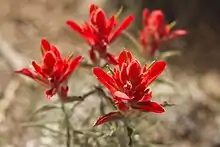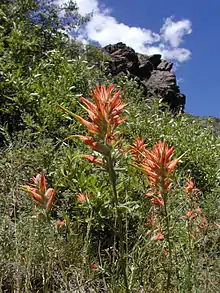Castilleja integra
Castilleja integra, with the common name wholeleaf paintbrush, is an partially parasitic herbaceous perennial plant native to the Southwestern United States.
| Castilleja integra | |
|---|---|
 | |
| Scientific classification | |
| Kingdom: | Plantae |
| Clade: | Tracheophytes |
| Clade: | Angiosperms |
| Clade: | Eudicots |
| Clade: | Asterids |
| Order: | Lamiales |
| Family: | Orobanchaceae |
| Genus: | Castilleja |
| Species: | C. integra |
| Binomial name | |
| Castilleja integra | |
| Synonyms[2] | |
| |
Description
Mature individuals of Castilleja integra are typically 9–50 cm in size, though they have been reported to grow as tall as 100 centimeters. The herbaceous stems regrow each season from a hard, woody structure called a caudex that is atop a substantial taproot or stout branched roots.[3] All above ground parts of the plants, the leaves, bracts, stems, and flowers, are covered in light coating of soft down, technically called tomentum.[4] The leaves are nearly entire and the species name, "integra", refers to this.[4]
The highly visible bracts are variable in color with occasional instances of rose, crimson, cerise, pale salmon, or pale yellow individuals, but most often an intense red-orange or orange flame color.[4][3]
Distribution
The plant is found in Arizona, Colorado, New Mexico, and Texas.
Castilleja integra was first discovered in the Organ Mountains of Southern New Mexico near El Paso, Texas by Charles Wright.[5] Its first published description was in 1858 by Asa Gray.[6][2]

Uses
The Zuni people used the root's bark, mixed with minerals, to dye deerskin black.[7]
References
- "NatureServe Explorer 2.0". explorer.natureserve.org. Retrieved 15 April 2023.
- "Castilleja integra A.Gray is an accepted name". theplantlist.org (The Plant List). 23 March 2013. Retrieved 23 December 2014.
- Egger, J. Mark; Zika, Peter F.; Wilson, Barbara L.; Brainerd, Richard E.; Otting, Nick. "Castilleja integra - FNA". Flora of North America. Retrieved 12 May 2023.
- Barr, Claude A. (1983). Jewels of the plains : wild flowers of the Great Plains grasslands and hills. Minneapolis: University of Minnesota Press. pp. 54–55. ISBN 0-8166-1127-0.
- Francis Whittier PennellThe Scrophulariaceae of Eastern Temperate North America at Google Books
- 'Rep. U.S. Mex. Bound'. 2(1): 119; by Asa Gray.
- Stevenson, Matilda Coxe 1915 Ethnobotany of the Zuni Indians. SI-BAE Annual Report #30 (p. 80)
